Alice Walker 艾丽斯·沃克+Everyday Use
- 格式:dps
- 大小:2.29 MB
- 文档页数:34

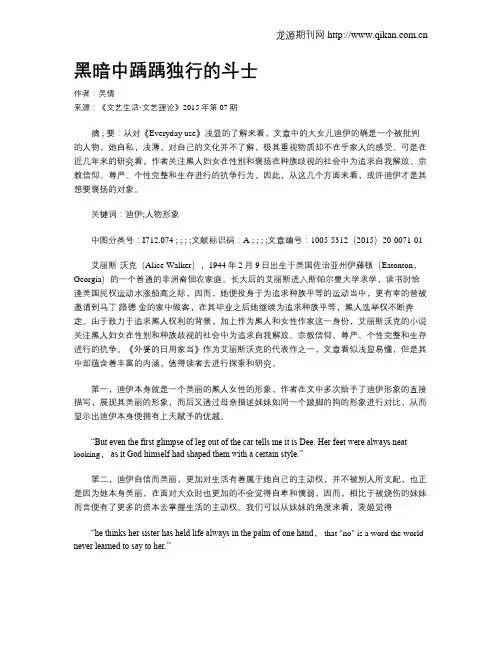
黑暗中踽踽独行的斗士作者:吴倩来源:《文艺生活·文艺理论》2015年第07期摘 ; 要:从对《Everyday use》浅显的了解来看,文章中的大女儿迪伊的确是一个被批判的人物,她自私,浅薄,对自己的文化并不了解,极其重视物质却不在乎家人的感受。
可是在近几年来的研究看,作者关注黑人妇女在性别和褒扬在种族歧视的社会中为追求自我解放、宗教信仰、尊严、个性完整和生存进行的抗争行为,因此,从这几个方面来看,或许迪伊才是其想要褒扬的对象。
关键词:迪伊;人物形象中图分类号:I712.074 ; ; ; ;文献标识码:A ; ; ; ;文章编号:1005-5312(2015)20-0071-01艾丽斯·沃克(Alice Walker),1944年2月9日出生于美国佐治亚州伊藤顿(Eatonton,Georgia)的一个普通的非洲裔佃农家庭。
长大后的艾丽斯进入斯帕尔曼大学求学,读书时恰逢美国民权运动水涨船高之际,因而,她便投身于为追求种族平等的运动当中,更有幸的曾被邀请到马丁路德金的家中做客,在其毕业之后她继续为追求种族平等,黑人选举权不断奔走。
由于致力于追求黑人权利的背景,加上作为黑人和女性作家这一身份,艾丽斯沃克的小说关注黑人妇女在性别和种族歧视的社会中为追求自我解放、宗教信仰、尊严、个性完整和生存进行的抗争。
《外婆的日用家当》作为艾丽斯沃克的代表作之一,文章看似浅显易懂,但是其中却蕴含着丰富的内涵,值得读者去进行探索和研究。
第一,迪伊本身就是一个美丽的黑人女性的形象,作者在文中多次给予了迪伊形象的直接描写,展现其美丽的形象,而后又通过母亲描述妹妹如同一个跛脚的狗的形象进行对比,从而显示出迪伊本身便拥有上天赋予的优越。
“But even the first glimpse of leg out of the car tells me it is Dee. Her feet were always neat-looking,as it God himself had shaped them with a certain style.”第二,迪伊自信而美丽,更加对生活有着属于她自己的主动权,并不被别人所支配,也正是因为她本身美丽,在面对大众时也更加的不会觉得自卑和懦弱,因而,相比于被烧伤的妹妹而言便有了更多的资本去掌握生活的主动权。
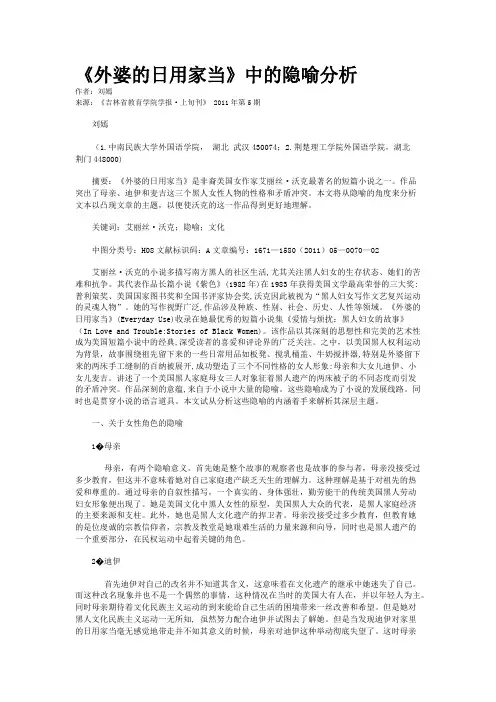
《外婆的日用家当》中的隐喻分析作者:刘嫣来源:《吉林省教育学院学报·上旬刊》 2011年第5期刘嫣(1.中南民族大学外国语学院,湖北武汉430074;2.荆楚理工学院外国语学院,湖北荆门448000)摘要:《外婆的日用家当》是非裔美国女作家艾丽丝·沃克最著名的短篇小说之一。
作品突出了母亲、迪伊和麦吉这三个黑人女性人物的性格和矛盾冲突。
本文将从隐喻的角度来分析文本以凸现文章的主题,以便使沃克的这一作品得到更好地理解。
关键词:艾丽丝·沃克;隐喻;文化中图分类号:H08文献标识码:A文章编号:1671—1580(2011)05—0070—02艾丽丝·沃克的小说多描写南方黑人的社区生活,尤其关注黑人妇女的生存状态、她们的苦难和抗争。
其代表作品长篇小说《紫色》(1982年)在1983年获得美国文学最高荣誉的三大奖:普利策奖、美国国家图书奖和全国书评家协会奖,沃克因此被视为“黑人妇女写作文艺复兴运动的灵魂人物”。
她的写作视野广泛,作品涉及种族、性别、社会、历史、人性等领域。
《外婆的日用家当》(Everyday Use)收录在她最优秀的短篇小说集《爱情与烦扰:黑人妇女的故事》(In Love and Trouble:Stories of Black Women)。
该作品以其深刻的思想性和完美的艺术性成为美国短篇小说中的经典,深受读者的喜爱和评论界的广泛关注。
之中,以美国黑人权利运动为背景,故事围绕祖先留下来的一些日常用品如板凳、搅乳桶盖、牛奶搅拌器,特别是外婆留下来的两床手工缝制的百纳被展开,成功塑造了三个不同性格的女人形象:母亲和大女儿迪伊、小女儿麦吉。
讲述了一个美国黑人家庭母女三人对象征着黑人遗产的两床被子的不同态度而引发的矛盾冲突。
作品深刻的意蕴,来自于小说中大量的隐喻。
这些隐喻成为了小说的发展线路。
同时也是贯穿小说的语言道具。
本文试从分析这些隐喻的内涵着手来解析其深层主题。


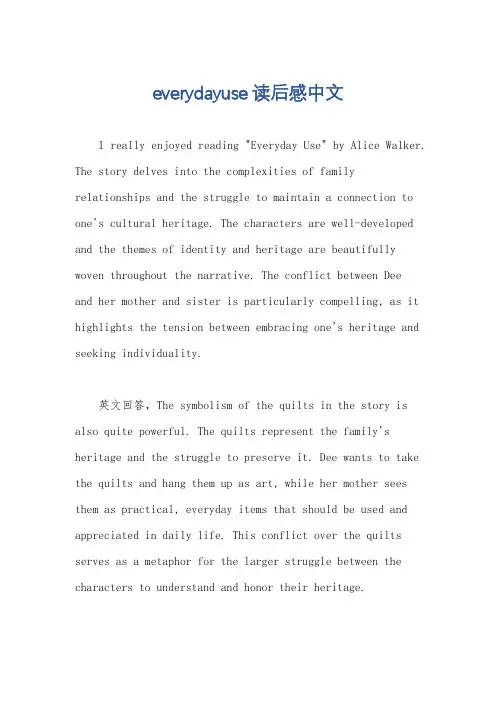
everydayuse读后感中文I really enjoyed reading "Everyday Use" by Alice Walker. The story delves into the complexities of family relationships and the struggle to maintain a connection to one's cultural heritage. The characters are well-developed and the themes of identity and heritage are beautifully woven throughout the narrative. The conflict between Deeand her mother and sister is particularly compelling, as it highlights the tension between embracing one's heritage and seeking individuality.英文回答,The symbolism of the quilts in the story is also quite powerful. The quilts represent the family's heritage and the struggle to preserve it. Dee wants to take the quilts and hang them up as art, while her mother sees them as practical, everyday items that should be used and appreciated in daily life. This conflict over the quilts serves as a metaphor for the larger struggle between the characters to understand and honor their heritage.Overall, "Everyday Use" is a thought-provoking and emotionally resonant story that explores the complexities of family dynamics and the importance of cultural heritage.中文回答,我非常喜欢阅读艾丽斯·沃克的《日常使用》。
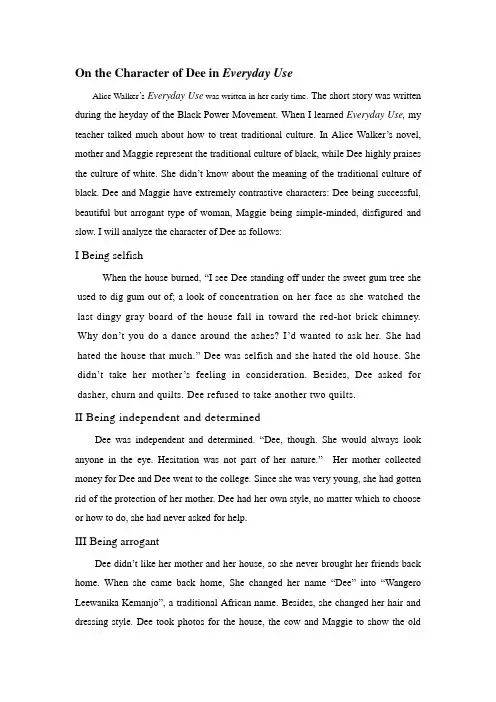
On the Character of Dee in Everyday UseAlice Walker’s Everyday Use was written in her early time. The short story was written during the heyday of the Black Power Movement. When I learned Everyday Use, my teacher talked much about how to treat traditional culture. In Alice Walker’s novel, mother and Maggie represent the traditional culture of black, while Dee highly praises the culture of white. She didn’t know about the meaning of the traditional culture of black. Dee and Maggie have extremely contrastive characters: Dee being successful, beautiful but arrogant type of woman, Maggie being simple-minded, disfigured and slow. I will analyze the character of Dee as follows:I Being selfishWhen the house burned, “I see Dee standing off under the sweet gum tree she used to dig gum out of; a look of concentration on her face as she watched the last dingy gray board of the house fall in toward the red-hot brick chimney. Why don’t you do a dance around the ashes? I’d wanted to ask her. She had hated the house that much.” Dee was selfish and she hated the old house. She didn’t take her mother’s feeling in consideration. Besides, Dee asked for dasher, churn and quilts. Dee refused to take another two quilts.II Being independent and determinedDee was independent and determined. “Dee, though. She would always look anyone in the eye. Hesitation was not part of her nature.”Her mother collected money for Dee and Dee went to the college. Since she was very young, she had gotten rid of the protection of her mother. Dee had her own style, no matter which to choose or how to do, she had never asked for help.III Being arrogantDee didn’t like her mother and her house, so she never brought her friends back home. When she came back home, She changed her name “Dee”into “Wangero Leewanika Kemanjo”, a traditional African name. Besides, she changed her hair and dressing style. Dee took photos for the house, the cow and Maggie to show the oldfashion off to her friends. But now it was different, Dee not only took photos, but also took her boyfriend back home. Compared with her former attitude towards everyday use, Dee showed tremendous cherish. She walked around the house to seek anything that had long history.In the past, the mother wanted to give the quilts to her elder daughter Dee. But Dee rejected them as too old-fashioned and out of style. Therefore the mother promised the quilts to her younger daughter Maggie. Now Dee asks her mother for the quilts and some more pieces of their family heritage because she now regards them as part of her cultural heritage, which she intends to hang on the wall. She wanted to show that she knew about African culture. So she was arrogant.In the end, against the expectation of Dee, the mother refused her wish and gave the quilts to Maggie, who would have agreed to give the quilts to her sister. Dee left without a piece of her family heritage, with her mother being satisfied with their simple southern life and with her sister Maggie, who would put the quilts to everyday use.。

E v e r y d a y U s e人物分析(总3页) -CAL-FENGHAI.-(YICAI)-Company One1-CAL-本页仅作为文档封面,使用请直接删除Character Analysis of the Everyday Use王鹤澎英语12012014/10/25Character Analysis of the Everyday UseTony WangAlice Walker, the splendid writer who main focused at American Women literature and black literature, wrote the Everyday Use at the beginning of the twentieth century. As one of the most famous short story of Alice Walker, Everyday Use represent the conflicts of three black women. And this story became classic work in American literature because of its profound ideological level and perfect artistic quality.There are three main character in the story. The Mama, a laborious woman; Dee, eldest daughter of Mama, who is beautiful, smart and well-educated; Maggie, in contrast with her sister, who is ugly, cowardice and self-abased. The writer used symbolize, metaphor and others rhetorical devices express the different attitudes of Negros when their culture was impact by a stronger one.Dee is the symbol of Black Culture Nationalism Activity. In the 1960s, some African-American started the Black Culture Nationalism Activity, which aimed at deny the unfair culture position and find Negro’s native culture. In the colonialist culture blacks become inferior nation, so Dee want to change this situation. She thought she love the everyday use of her family, changed her name which she thought was white imposed to her, worn the native clothes (in her mind) of black. However, she still cannot find her position in her mind. In fact, Dee was the woman who wandered between the first world and the third world. She want to enter the main world with her dignity and honor of Negros, but fell into the marsh of confuse. Faced with westerners, she cannot say a word or in accordance with her native culture. In the other hand, faced with her family, she had superiority complex strangely. Because she abandoned one important part of her native culture stage –Negros’ humiliating history. She was not grieved when the house, which was full of he r family’s suffering, burned into ash; she ignore the feeling of her younger sister Maggie, the symbol of African-American’s suffering; she even want to rap the qui lts which is the only thing Mama gave to Maggie. She thought she was finding the root of African culture, but what she did was deviate from her original intention. At all, Dee is only a perplexed woman infected by crowd mentality. She didn’t know that the right attitude to culture heritage is use it as everyday use and renew it continually.Poor Maggie is the youngest daughter of this complicated family. It seemed that all the pains were concentrated into her body. She endured three different kind of pain. The first is the pain caused by slavery system. The Mama used this kind of sentence to describe Maggie - “Have you ever seen a lame animal, perhaps a dog run over some careless person rich enough to own a car, sidle up to someone who is ignorant enough to be kind of him”. The rich man is the representation of white. Mama‘s meaning is that the sca rs of Maggie were given by white, in other word, slavery system. The second pain is the ignorance and deny of Black Culture Nationalism Activity. The reader of Everyday Use can easily attracted by the big difference between Dee and Maggie. This difference can make readers realized theconflict of blacks’ nowadays wander and the heavy history. Some radical black nationalists feel shame because of the exist of “Maggies”, they want hide this history stage totally. This irresponsible action is no other than the murder of African-Americans’ native culture. The third pain was caused by Mama’s intentional dodge. Mama is one of the most classic Negro women, also the representation of common black people. This kind of dodge can be realized as the dodge of common black people to their suffering history. But at the end of story Mama still insisted to give the quit to Maggie. This can indicate that the common blacks still stand at the right position when they facing their culture. This is the choice of Mama, also Alice Walker.Mama is the most complex character in this short story. To Dee, she was pound of her ability and appearance. Mama wandered Dee can give herself and her family a better life. But she was disappointed by Dee’s performances. This also means that the common were disappointed by Black Culture Nationalism Activity. Mama did a lot effort to know De e’s new life. But when Dee wanted to rap the everyday use of her family to find so-called native culture, Mama was totally despair. To Maggie, Mama’s inchoative a ttitude was dodge and ignore intent deliberately. When Maggie said that “How I look, Mama” Mama just said “Come out into the yard. ”and diverge the talk. Because Mama was helpless when she faced Maggie, just as black common were helpless when talking about the suffering history. At last, one sentence of Maggie disenchant Mama. “I can member Grandma Dee without the quilts.” This words shocked Mama deeply, let her knew who was the best heir of the quilts and the whole family. And this behavior also means that the black common found their sense of culture belonging at last – only the people who can afford the whole history of blacks can be the heirs of the black culture.Alice Walker gave different symbol to these character. Just as one old saying in China, true gold will find its price. Alice Walker leaded black public face up to their true culture, criticized the error occurred when black nationalists looking forward to their native culture root. She gave this activity a new beginning.。


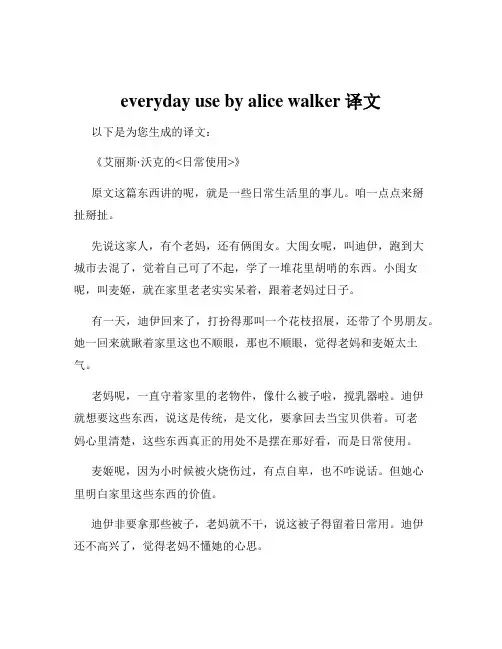
everyday use by alice walker译文以下是为您生成的译文:《艾丽斯·沃克的<日常使用>》原文这篇东西讲的呢,就是一些日常生活里的事儿。
咱一点点来掰扯掰扯。
先说这家人,有个老妈,还有俩闺女。
大闺女呢,叫迪伊,跑到大城市去混了,觉着自己可了不起,学了一堆花里胡哨的东西。
小闺女呢,叫麦姬,就在家里老老实实呆着,跟着老妈过日子。
有一天,迪伊回来了,打扮得那叫一个花枝招展,还带了个男朋友。
她一回来就瞅着家里这也不顺眼,那也不顺眼,觉得老妈和麦姬太土气。
老妈呢,一直守着家里的老物件,像什么被子啦,搅乳器啦。
迪伊就想要这些东西,说这是传统,是文化,要拿回去当宝贝供着。
可老妈心里清楚,这些东西真正的用处不是摆在那好看,而是日常使用。
麦姬呢,因为小时候被火烧伤过,有点自卑,也不咋说话。
但她心里明白家里这些东西的价值。
迪伊非要拿那些被子,老妈就不干,说这被子得留着日常用。
迪伊还不高兴了,觉得老妈不懂她的心思。
其实啊,老妈心里跟明镜似的,知道啥是真正的过日子,啥是表面的花架子。
最后老妈还是把被子给了麦姬,因为她知道麦姬会像一直以来那样,踏踏实实地用这些东西。
这故事说的就是,有时候咱别光追求那些看着高大上的东西,真正的生活还是平平常常、实实在在的好。
就像家里那些老物件,能用在日常生活里,那才有价值,光摆着好看有啥用?咱过日子得脚踏实地,别整那些虚头巴脑的。
这故事出自艾丽斯·沃克的手笔,她写这故事就是想让咱明白,生活的真谛就在那些日常的点点滴滴里,别瞎折腾,别光追求表面的光鲜。
咱得实实在在地过日子,珍惜身边那些普普通通却又实实在在的东西。
Unit 3 Everyday Use by Alice Walker❑Alice Walker (1944- ) poet, novelist and essayist born into a poor rural family for which her parents made a living by growing cotton.❑Being a teacher of creative writing and black literature, lecturing at college and university❑Alice Walker is at her best when portraying people living in the rural areas where the writer was born and grew up.❑As a black writer, Walker is particularly interested in examining the relationship among the blacks themselves.❑The Black Power movement grew out of the CIVIL RIGHTS MOVEMENT that had steadily gained momentum through the 1950s and 1960s. Although not a formal movement, the Black Power movement marked a turning point in black-white relations in the United States and also in how blacks saw themselves.❑The movement was hailed by some as a positive and proactive force aimed at helping blacks achieve full equality with whites, but it was reviled by others as a militant, sometimes violent faction whose primary goal was to drivea wedge between whites and blacks. In truth, the Black Power movement was a complex event that took place ata time when society and culture was being transformed throughout the United States, and its legacy reflects thatcomplexity.❑The Black Power movement instilled a sense of racial pride and self-esteem in blacks. Blacks were told that it was up to them to improve their lives. Black Power advocates encouraged blacks to form or join all-black political parties that could provide a formidable power base and offer a foundation for real socioeconomic progress.❑For years, the movement's leaders said, blacks had been trying to aspire to white ideals of what they should be.Now it was time for blacks to set their own agenda, putting their needs and aspirations first. An early step, in fact, was the replacement of the word "Negro" (a word associated with the years of SLAVERY) with "black."❑The movement generated a number of positive developments. Probably the most noteworthy of these was its influence on black culture. For the first time, blacks in the United States were encouraged to acknowledge their African heritage. COLLEGES AND UNIVERSITIES established black studies programs and black studies departments. Blacks who had grown up believing that they were descended from a backwards people now found out that African culture was as rich and diverse as any other, and they were encouraged to take pride in that heritage.The characters in Everyday Use❑The mother, the two daughters (Dee and Maggie)❑There is a sharp contrast between the two daughters❑Dee’s attitude towards the house, the churn top and the quilts❑The mother and Maggie’s attitude towards DeeThe mother❑ 1.Being a ty pical working woman who is far different from Dee’s ideal mother 2. Being fat, shy and timid ❑ 3. Being with little education, but not without intelligence and perceptionThe analysis of the character—Maggie❑Being homely (not good-looking), like a lame animal with burn scars down her arms and legs❑Being shy, timid❑Eying her sister with the mixture of envy and awe,❑Being nervous when meeting Dee❑The art makerDee❑Being pretty❑Life is generous to her. The world never says “no” to her.❑Having a style of her own and knew what style is.❑Being bold and undaunted (不退缩)and having a strong character,❑Being not an easy person to get along with❑Looking down upon her mother and sisterThe theme of Everyday UseWith her story, Alice Walker is saying that art should be a living, breathing part of the culture it arose from, rather than a frozen timepiece to be observed from a distance. To make this point, she uses the quilts in her story to symbolize art; and what happens to these quilts represents her theory of art.The attitudes towards art❑The two sisters' values concerning the quilt represent the two main approaches to art appreciation in our society.Art can be valued for financial and aesthetic reasons, or it can be valued for personal and emotional reasons.When the narrator snatches the quilts from Dee and gives them to Maggie, Walker is saying that the second set of values is the correct one. Art, in order to be kept alive, must be put to "Everyday Use" — literally in the case of the quilts, figuratively in the case of conventional art.Other views on Everyday Use❑...all three women characters are artists: Mama, as the narrator, tells her own story; Maggie is the quilt- maker, the creator of art for Everyday Use; Dee, the photographer and collector of art, has designed her jewelry, dress and hair so deliberately and self- consciously that she appears in the story as a self-creation.❑She never takes a shot without making sure the house is included.❑In this sentence the author uses one figure of speech: litotes.第二个介绍•Award•In 1983, The Color Purple won the Pulitzer Prize for Fiction(普利策小说奖), making Walker the first black woman to win. Walker was also the first black woman to win the National Book Award(国家图书奖)。
Everyday UseAlice WalkerI will wait for her in the yard that Maggie and I made so clean and wavy yesterday afternoon.A yard like this is more comfortable than most people know. It is not just a yard. It is like an extended living room. When the hard clay is swept clean as a floor and the fine sand around the edges lined with tiny, irregular grooves, anyone can come and sit and look up into the elm tree and wait for the breezes that never come inside the house.Maggie will be nervous until after her sister goes: she will stand hopelessly in corners, homely and ashamed of the burn scars down her arms and legs, eying her sister with a mixture of envy and awe. She thinks her sister has held life always in the palm of one hand, that "no" is a word the world never learned to say to her.You've no doubt seen those TV shows where the child who has "made it" is confronted, as a surprise, by her own mother and father, tottering in weakly from backstage. (A pleasant surprise, of course: What would they do if parent and child came on the show only to curse out and insult each other?) On TV mother and child embrace and smile into each other's faces. Sometimes the mother and father weep, the child wraps them in her arms and leans across the table to tell how she would not have made it without their help. I have seen these programs.Sometimes I dream a dream in which Dee and I are suddenly brought together on a TV program of this sort. Out of a dark and soft-seated limousine I am ushered into a bright room filled with many people. There I meet a smiling, gray, sporty man like Johnny Carson who shakes my hand and tells me what a fine girl I have. Then we are on the stage and Dee is embracing me with tears in her eyes. She pins on my dress a large orchid, even though she has told me once that she thinks orchids are tacky flowers.In real life I am a large, big-boned woman with rough, man-working hands. In the winter I wear flannel nightgowns to bed and overalls during the day. I can kill and clean a hog as mercilessly as a man. My fat keeps me hot in zero weather. I can work outside all day, breaking ice to get water for washing; I can eat pork liver cooked over the open fire minutes after it comes steaming from the hog. One winter I knocked a bull calf straight in the brain between the eyes with a sledge hammer and had the meat hung up to chill before nightfall. But of course all this does not show on television. I am the way my daughter would want me to be: a hundred pounds lighter, my skin like an uncooked barley pancake. My hair glistens in the hot bright lights. Johnny Carson has much to do to keep up with my quick and witty tongue.But that is a mistake. I know even before I wake up. Who ever knew a Johnson with a quick tongue? Who can even imagine me looking a strange white man in the eye? It seems to me I have talked to them always with one foot raised in flight, with my head fumed in whichever way is farthest from them. Dee, though. She would always look anyone in the eye. Hesitation was no part of her nature."How do I look, Mama?" Maggie says, showing just enough of her thin body enveloped in pink skirt and red blouse for me to know she's there, almost hidden by the door."Come out into the yard," I say.Have you ever seen a lame animal, perhaps a dog run over by some careless person rich enough to own a car, sidle up to someone who is ignorant enough to be kind to him? That is theway my Maggie walks. She has been like this, chin on chest, eyes on ground, feet in shuffle, ever since the fire that burned the other house to the ground.Dee is lighter than Maggie, with nicer hair and a fuller figure. She's a woman now, though sometimes I forget. How long ago was it that the other house burned? Ten, twelve years? Sometimes I can still hear the flames and feel Maggie's arms sticking to me, her hair smoking and her dress falling off her in little black papery flakes. Her eyes seemed stretched open, blazed open by the flames reflected in them. And Dee. I see her standing off under the sweet gum tree she used to dig gum out of; a look of concentration on her face as she watched the last dingy gray board of the house fall in toward the red-hot brick chimney. Why don't you do a dance around the ashes? I'd wanted to ask her. She had hated the house that much.I used to think she hated Maggie, too. But that was before we raised money, the church and me, to send her to Augusta to school. She used to read to us without pity; forcing words, lies, other folks' habits, whole lives upon us two, sitting trapped and ignorant underneath her voice. She washed us in a river of make-believe, burned us with a lot of knowledge we didn't necessarily need to know. Pressed us to her with the serious way she read, to shove us away at just the moment, like dimwits, we seemed about to understand.Dee wanted nice things. A yellow organdy dress to wear to her graduation from high school; black pumps to match a green suit she'd made from an old suit somebody gave me. She was determined to stare down any disaster in her efforts. Her eyelids would not flicker for minutes at a time. Often I fought off the temptation to shake her. At sixteen she had a style of her own: and knew what style was.I never had an education myself. After second grade the school was closed down. Don't ask my why: in 1927 colored asked fewer questions than they do now. Sometimes Maggie reads to me. She stumbles along good-naturedly but can't see well. She knows she is not bright. Like good looks and money, quickness passes her by. She will marry John Thomas (who has mossy teeth in an earnest face) and then I'll be free to sit here and I guess just sing church songs to myself. Although I never was a good singer. Never could carry a tune. I was always better at a man's job. I used to love to milk till I was hooked in the side in '49. Cows are soothing and slow and don't bother you, unless you try to milk them the wrong way.I have deliberately turned my back on the house. It is three rooms, just like the one that burned, except the roof is tin; they don't make shingle roofs any more. There are no real windows, just some holes cut in the sides, like the portholes in a ship, but not round and not square, with rawhide holding the shutters up on the outside. This house is in a pasture, too, like the other one. No doubt when Dee sees it she will want to tear it down. She wrote me once that no matter where we "choose" to live, she will manage to come see us. But she will never bring her friends. Maggie and I thought about this and Maggie asked me, "Mama, when did Dee ever have any friends?"She had a few. Furtive boys in pink shirts hanging about on washday after school. Nervous girls who never laughed. Impressed with her they worshiped the well-turned phrase, the cute shape, the scalding humor that erupted like bubbles in Iye. She read to them.When she was courting Jimmy T she didn't have much time to pay to us, but turned all her faultfinding power on him. He flew to marry a cheap city girl from a family of ignorant flashy people. She hardly had time to recompose herself.When she comes I will meet—but there they are!Maggie attempts to make a dash for the house, in her shuffling way, but I stay her with my hand. "Come back here, " I say. And she stops and tries to dig a well in the sand with her toe.It is hard to see them clearly through the strong sun. But even the first glimpse of leg out of the car tells me it is Dee. Her feet were always neat-looking, as if God himself had shaped them with a certain style. From the other side of the car comes a short, stocky man. Hair is all over his head a foot long and hanging from his chin like a kinky mule tail. I hear Maggie suck in her breath. "Uhnnnh, " is what it sounds like. Like when you see the wriggling end of a snake just in front of your foot on the road. "Uhnnnh."Dee next. A dress down to the ground, in this hot weather. A dress so loud it hurts my eyes. There are yellows and oranges enough to throw back the light of the sun. I feel my whole face warming from the heat waves it throws out. Earrings gold, too, and hanging down to her shoulders. Bracelets dangling and making noises when she moves her arm up to shake the folds of the dress out of her armpits. The dress is loose and flows, and as she walks closer, I like it. I hear Maggie go "Uhnnnh" again. It is her sister's hair. It stands straight up like the wool on a sheep. It is black as night and around the edges are two long pigtails that rope about like small lizards disappearing behind her ears."Wa-su-zo-Tean-o!" she says, coming on in that gliding way the dress makes her move. The short stocky fellow with the hair to his navel is all grinning and he follows up with "Asalamalakim, my mother and sister!" He moves to hug Maggie but she falls back, right up against the back of my chair. I feel her trembling there and when I look up I see the perspiration falling off her chin."Don't get up," says Dee. Since I am stout it takes something of a push. You can see me trying to move a second or two before I make it. She turns, showing white heels through her sandals, and goes back to the car. Out she peeks next with a Polaroid. She stoops down quickly and lines up picture after picture of me sitting there in front of the house with Maggie cowering behind me. She never takes a shot without making sure the house is included. When a cow comes nibbling around the edge of the yard she snaps it and me and Maggie and the house. Then she puts the Polaroid in the back seat of the car, and comes up and kisses me on the forehead.Meanwhile Asalamalakim is going through motions with Maggie's hand. Maggie's hand is as limp as a fish, and probably as cold, despite the sweat, and she keeps trying to pull it back. It looks like Asalamalakim wants to shake hands but wants to do it fancy. Or maybe he don't know how people shake hands. Anyhow, he soon gives up on Maggie."Well," I say. "Dee.""No, Mama," she says. "Not 'Dee,' Wangero Leewanika Kemanjo!""What happened to 'Dee'?" I wanted to know."She's dead," Wangero said. "I couldn't bear it any longer, being named after the people who oppress me.""You know as well as me you was named after your aunt Dicie," I said. Dicie is my sister. She named Dee. We called her "Big Dee" after Dee was born."But who was she named after?" asked Wangero."I guess after Grandma Dee," I said."And who was she named after?" asked Wangero."Her mother," I said, and saw Wangero was getting tired. "That's about as far back as I can trace it," I said. Though, in fact, I probably could have carried it back beyond the Civil War through the branches."Well," said Asalamalakim, "there you are.""Uhnnnh," I heard Maggie say."There I was not," I said, "before 'Dicie' cropped up in our family, so why should I try to trace it that far back?"He just stood there grinning, looking down on me like somebody inspecting a Model A car. Every once in a while he and Wangero sent eye signals over my head."How do you pronounce this name?" I asked."You don't have to call me by it if you don't want to," said Wangero."Why shouldn't 1?" I asked. "If that's what you want us to call you, we'll call you.""I know it might sound awkward at first," said Wangero."I'll get used to it," I said. "Ream it out again."Well, soon we got the name out of the way. Asalamalakim had a name twice as long and three times as hard. After I tripped over it two or three times he told me to just call him Hakim-a-barber. I wanted to ask him was he a barber, but I didn't really think he was, so I didn't ask."You must belong to those beef-cattle peoples down the road," I said. They said "Asalamalakim" when they met you, too, but they didn't shake hands. Always too busy: feeding the cattle, fixing the fences, putting up salt-lick shelters, throwing down hay. When the white folks poisoned some of the herd the men stayed up all night with rifles in their hands. I walked a mile and a half just to see the sight.Hakim-a-barber said, "I accept some of their doctrines, but farming and raising cattle is not my style." (They didn't tell me, and I didn't ask, whether Wangero (Dee) had really gone and married him.)We sat down to eat and right away he said he didn't eat collards and pork was unclean. Wangero, though, went on through the chitlins and com bread, the greens and everything else. She talked a blue streak over the sweet potatoes. Everything delighted her. Even the fact that we still used the benches her daddy made for the table when we couldn't effort to buy chairs."Oh, Mama!" she cried. Then turned to Hakim-a-barber. "I never knew how lovely these benches are. You can feel the rump prints," she said, running her hands underneath her and along the bench. Then she gave a sigh and her hand closed over Grandma Dee's butter dish. "That's it!" she said. "I knew there was something I wanted to ask you if I could have." She jumped up from the table and went over in the corner where the churn stood, the milk in it crabber by now. She looked at the churn and looked at it."This churn top is what I need," she said. "Didn't Uncle Buddy whittle it out of a tree you all used to have?""Yes," I said."Un huh," she said happily. "And I want the dasher, too.""Uncle Buddy whittle that, too?" asked the barber.Dee (Wangero) looked up at me."Aunt Dee's first husband whittled the dash," said Maggie so low you almost couldn't hear her. "His name was Henry, but they called him Stash.""Maggie's brain is like an elephant's," Wangero said, laughing. "I can use the chute top as a centerpiece for the alcove table," she said, sliding a plate over the chute, "and I'll think of something artistic to do with the dasher."When she finished wrapping the dasher the handle stuck out. I took it for a moment in my hands. You didn't even have to look close to see where hands pushing the dasher up and down to make butter had left a kind of sink in the wood. In fact, there were a lot of small sinks; you could see where thumbs and fingers had sunk into the wood. It was beautiful light yellow wood, from a tree that grew in the yard where Big Dee and Stash had lived.After dinner Dee (Wangero) went to the trunk at the foot of my bed and started rifling through it. Maggie hung back in the kitchen over the dishpan. Out came Wangero with two quilts. They had been pieced by Grandma Dee and then Big Dee and me had hung them on the quilt frames on the front porch and quilted them. One was in the Lone Stat pattern. The other was Walk Around the Mountain. In both of them were scraps of dresses Grandma Dee had worn fifty and more years ago. Bits and pieces of Grandpa Jarrell's Paisley shirts. And one teeny faded blue piece, about the size of a penny matchbox, that was from Great Grandpa Ezra's uniform that he wore in the Civil War."Mama," Wangro said sweet as a bird. "Can I have these old quilts?"I heard something fall in the kitchen, and a minute later the kitchen door slammed."Why don't you take one or two of the others?" I asked. "These old things was just done by me and Big Dee from some tops your grandma pieced before she died.""No," said Wangero. "I don't want those. They are stitched around the borders by machine.""That'll make them last better," I said."That's not the point," said Wangero. "These are all pieces of dresses Grandma used to wear. She did all this stitching by hand. Imagine!" She held the quilts securely in her arms, stroking them."Some of the pieces, like those lavender ones, come from old clothes her mother handed down to her," I said, moving up to touch the quilts. Dee (Wangero) moved back just enough so that I couldn't reach the quilts. They already belonged to her."Imagine!" she breathed again, clutching them closely to her bosom."The truth is," I said, "I promised to give them quilts to Maggie, for when she marries John Thomas."She gasped like a bee had stung her."Maggie can't appreciate these quilts!" she said. "She'd probably be backward enough to put them to everyday use.""I reckon she would," I said. "God knows I been saving 'em for long enough with nobody using 'em. I hope she will!" I didn't want to bring up how I had offered Dee (Wangero) a quilt when she went away to college. Then she had told they were old-fashioned, out of style."But they're priceless!" she was saying now, furiously; for she has a temper. "Maggie would put them on the bed and in five years they'd be in rags. Less than that!""She can always make some more," I said. "Maggie knows how to quilt."Dee (Wangero) looked at me with hatred. "You just will not understand. The point is these quilts, these quilts!""Well," I said, stumped. "What would you do with them7""Hang them," she said. As if that was the only thing you could do with quilts.Maggie by now was standing in the door. I could almost hear the sound her feet made as they scraped over each other."She can have them, Mama," she said, like somebody used to never winning anything, or having anything reserved for her. "I can 'member Grandma Dee without the quilts."I looked at her hard. She had filled her bottom lip with checkerberry snuff and gave her facea kind of dopey, hangdog look. It was Grandma Dee and Big Dee who taught her how to quilt herself. She stood there with her scarred hands hidden in the folds of her skirt. She looked at her sister with something like fear but she wasn't mad at her. This was Maggie's portion. This was the way she knew God to work.When I looked at her like that something hit me in the top of my head and ran down to the soles of my feet. Just like when I'm in church and the spirit of God touches me and I get happy and shout. I did something I never done before: hugged Maggie to me, then dragged her on into the room, snatched the quilts out of Miss Wangero's hands and dumped them into Maggie's lap. Maggie just sat there on my bed with her mouth open."Take one or two of the others," I said to Dee.But she turned without a word and went out to Hakim-a-barber."You just don't understand," she said, as Maggie and I came out to the car."What don't I understand?" I wanted to know."Your heritage," she said, And then she turned to Maggie, kissed her, and said, "You ought to try to make something of yourself, too, Maggie. It's really a new day for us. But from the way you and Mama still live you'd never know it."She put on some sunglasses that hid everything above the tip of her nose and chin.Maggie smiled; maybe at the sunglasses. But a real smile, not scared. After we watched the car dust settle I asked Maggie to bring me a dip of snuff. And then the two of us sat there just enjoying, until it was time to go in the house and go to bed.。
黑人民权的实践者--《外婆的日用家当》中迪伊形象的再解读佚名【摘要】关于艾丽斯・沃克的短篇小说《外婆的日用家当》,以往评论对于其中的姐姐迪伊多是冠以消极否定之辞。
本文结合小说发生的社会历史背景———美国黑人民权运动,重新审视了迪伊在整篇小说中的角色,肯定了她在民权运动中以自己的实践行为来表达对追求黑人权利平等的渴望。
%In one of Alice Walker's short stories ——— Everyday Use ,many reviews and analyses fix Dee as a negative image .Combined with the social and historical background of Black Power Movement , this paper aims to re - evaluate the role of Dee so as to confirm her longing for Black equal rights with her practice in reality .【期刊名称】《滁州学院学报》【年(卷),期】2013(000)003【总页数】5页(P67-71)【关键词】《外婆的日用家当》;美国黑人民权运动;迪伊【正文语种】中文【中图分类】I206艾丽斯·沃克(Alice Walker)的《外婆的日用家当》(“Everyday Use”)发表于1973年,刚问世时并没有在评论界引起多大关注。
直到她因《紫色》(“The Color Purple”,1982)获得普利策文学奖,国内外才渐渐开始关注沃克的作品。
[1]关于这篇小说,国内的评论大多是从以下几种视角进行研究:(1)女性主义批评视角;(2)文化身份认同分析视角;(3)人物塑造和遗产继承分析视角;(4)创作心理分析视角;(5)文本修辞手法分析。
女性主义批评主要是根据沃克的“妇女主义”思想,分析在男性人物几近缺失的前提下如何突显黑人女性话语。
Everyday Use人物分析兼论其主题[摘要]在Everyday Use中,Maggie and Dee虽是出生于同一家庭的俩姐妹,但由于种种原因而形成的身体和心理方面的差异极大。
本文着重分析了这两个人物的差异,并探讨了其主题。
[关键词]Everyday Use,人物,主题Everyday Use出自〈高级英语〉(第一册,张汉熙主编)第四课,其作者是美国现代著名女作家Alice Walker。
作者在课文中以第一人称(mother of Dee and Maggie)巧妙、含蓄地道出两代黑人(mother and her two daughters)或者说同一代黑人(Dee and Maggie,two sisters)之间在思想观念以及黑人文化遗产上所面临的两难抉择以及他们所持的复杂态度。
尤其是关于黑人母亲对自己两个女儿(Dee and Maggie)的评价的描写更加有力地彰显了这种抉择的艰难和态度的复杂。
可见,Maggie and Dee虽是出生于同一家庭的俩姐妹,但由于种种原因而形成的身体和心理方面的差异极大。
一、Maggie and Dee差异分析作为少数民族最大的群体,美国的黑人是在经过数百年的交叉影响和相互作用下,非洲文化同美国白人文化的共同交融而孕育出的一种新型黑人—美国黑人或称美国非洲裔黑人。
由于美国政府在南北战争前一直奉行白人至上的政策,因此,虽然在数量上作为少数民族最大的群体的美国黑人,他们在政治、经济、文化以及社会生活等各方面却一直处于无权和被压迫的境地。
Alice Walke生于1944年,此时的美国在政治上较之从前已经发生了天翻地覆的变化。
比如说,轰轰烈烈的、席卷全国的废奴运动业已结束,发端于20 世纪20年代纽约市黑人聚居区—哈莱姆的“黑人文艺复兴”也方兴未艾。
因此,她所耳闻目睹的美国黑人无论在政治、经济还是文化等方面都有了明显的改观。
事实上,Alice Walke时代的美国黑人正面临着这样一种两难抉择:一方面,他们要不失时机地与白人交流和融合;另一方面,他们又必须想方设法地保全自己的传统和文化。
Black woman can survive onlyby recovering the heritage oftheir ancestors .—Alice WalkerCatalogue1.Life experience2.Activism3.The thought of Walker's Writing4.Womanism5.Works6.Everyday useLife experience•Walker was born in 1944 Eatonton, Georgia in a tenant family .She is the youngest one of the eight children.•Growing up with an oral tradition, listening to stories from her grandfather , Walker was writing—very privately—since she was eight years old. "With my family, I had to hide things," she said."And I had to keep a lot in my mind.“•In 1952, Walker was accidentally wounded in the right eye by a shot from a BB gun fired by one of her brothers and becamepermanently blind in that eye, felt like an outcast and she turned for solace to reading and to writing poetry. She realized that her traumatic外伤的injury had some value: it allowed her to begin “really to see people and things, really to notice relationships and to learn to be patient enough to care about how theyturned out.•In high school , she became valedictorian 告别演说者and got rehabilitation 康复scholarship which made her toSpelman, a college for black woman, in Atlanta.•During her junior year, she went to Africa as an exchangestudent. She got her BA degree in 1965.•In 1965, Walker met Melvyn Rosenman Leventhal, a Jewish civil rights lawyer. They were married on March 17, 1967 in New York City. Later that year the couple relocated to Jackson, Mississippi, becoming "the first legally married inter-racial couple in Mississippi ". Theywere harassed and threatened by whites, including the KuKlux Klan. The couple had a daughter Rebecca in 1969.Walker and her husband divorced in 1976.•She is teaching in Yale University.三K 党(Klu Klux Klan ,缩写为KKK ),是美国历史上和现在的一个奉行白人至上主义的民间组织,也是美国种族主义的代表性组织。
三K 党是美国最悠久、最庞大的恐怖主义组织。
•Alice Walker met Martin Luther King Jr. when she was a student at Spelman College in Atlanta in the early 1960s. Walker credits King for her decision to return to the American South as an activist for the Civil Rights Movement. •She attended the famous 1963 March onWashington. As a young adult she volunteered her time registering voters in Georgia and Mississippi.•On March 8, 2003, International Women's Day, on the eve of the Iraq War, Alice Walker was arrested along with 24 others for crossing a police lineduring an anti-war protest rally游行outside the White House."I was with other women who believe that the women and children of Iraq are just as dear as the women and children in our families, and that, in fact, we are one family. And so it would have felt to me that we were going over to actually bomb ourselves."•In November 2008, Walker wrote "An Open Letter to Barack Obama" ,"Seeing you take your rightful place, based solely on your wisdom, stamina活力, and character, is a balm镇痛膏for the weary warriors of hope, previously only sung about."•In March 2009, Walker traveled to Gaza along with a group of 60 other female activists from the anti-war group Code Pink, in response to the Gaza War. Their purpose was to deliver aid, to meet with NGOs (Non Governmental Organisations)and residents, and to persuade Israel and Egypt to open their borders with Gaza.•In a June 2011 interview, Walker described the United States and Israel as "terrorist organizations", stating "When you terrorize people, when you make them so afraid of you that they are just mentally and psychologically wounded for life --that's terrorism."Walker supports the Boycott, Divestment and Sanctions制裁campaign against Israel.Her themes are generally revolutionary and confront the contemporary experience of black Americans, particularly black American women, via their cultural, social, and political history.Her writing explores multi-dimensional kinship among women, among men and women, among humans and animals, and embraces the redemptive power of social,spiritual and political revolution.Alice Walker ‘s creative vision is rooted in the economic hardship, racial terrorism, and folk wisdom of African American life and culture, particularly in the rural South .Alice Walker is an American novelist, short-story writer, poet, essayist, and activist .•艾丽丝·沃克的作品所涉及的主题极具普遍意义,例如:精神生存、个人认同、自由和力量,以及自我与社群的内在联系。
她把对于这些问题的关心,有力地投射到了黑人女性的经验之中。
她认为种族主义和性别歧视都是男权文化所产生的后果,她要揭示它们对个人的摧残。
•艾丽丝·沃克认为在种族主义和性别主义的双重压迫下,黑人妇女的生存状态,尤其精神世界是分裂、破碎、不完整的。